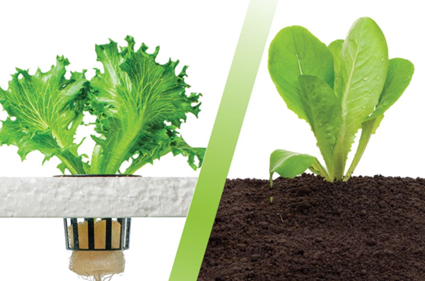What Is The Difference Between Hydroponic, Organic, And “Regular” Soil Fertilizers?

Both hydroponic fertilizers and those intended for use in soil contain the three major nutrients, nitrogen, phosphorus and potassium. The major difference in hydroponic fertilizers is that they contain the proper amounts of all the essential micro-nutrients which fertilizers intended for use with soil farming DO NOT contain. The plants are expected to find these elements in the soil, assuming that the trace elements are in fact present. Problems can arise for the plants if any or all the micro-nutrients are not present in the soil or are depleted by successive (or excessive) plantings. This is common in soil farming.
Our method of organic growing, however, we call ‘Hydro-Organic’ applies wood chips, Pete moss, oyster shells, or other hydroponic media to Organic soil used to produce fertilizer that is a more refined form of media with fewer impurities making them both more stable and soluble for better plant absorption. Organic fertilizers, in most cases, are very different than either hydroponic or soil fertilizers BOTH in composition; and in how they deliver the nutrients to the plants. Organic fertilizers rely on the synergistic action of bacteria and microbes to break down nutritional substances for easier uptake by the plants. Hydroponic and soil fertilizers provide nutrients in a ready-to-use form. While once, they were mutually exclusive, in recent years several outstanding organic fertilizers have hit the market in formulations refined enough for use in hydroponics through a hydro-organic method.
Why Does Hydroponics, Aquaponics, Aeroponics Work So Well!
That’s simple. If you give a plant exactly what it needs, when it needs it, in the amount that it needs, the plant will be as healthy as is genetically possible. With Hydroponics, Aquaponics, Aeroponics this is an easy task; in soil it is far more difficult.
With Hydroponics, Aquaponics, Aeroponics the plants are grown in an inert growing medium and a perfectly balanced, pH adjusted nutrient solution is delivered to the roots in a highly soluble form. This allows the plant to uptake its food with very little effort as opposed to soil where the roots must search out the nutrients and extract them. This is true even when using rich, organic soil and top of the line nutrients. The energy expended by the roots in this process is energy better spent on vegetative growth and fruit and flower production!
If you grow two genetically identical plants using soil for one and Hydroponics, Aquaponics, or an Aeroponics plants for the other, you will almost immediately see the difference this factor makes. Faster, better growth and much greater yields are just some of the many reasons that ‘Ponics’ farming is being adapted around the world for commercial food production, as well as a growing number of homes and gardeners.
With the normal farming or the soil farming, there are multiple problems such as pest, climate, and soil diseases
